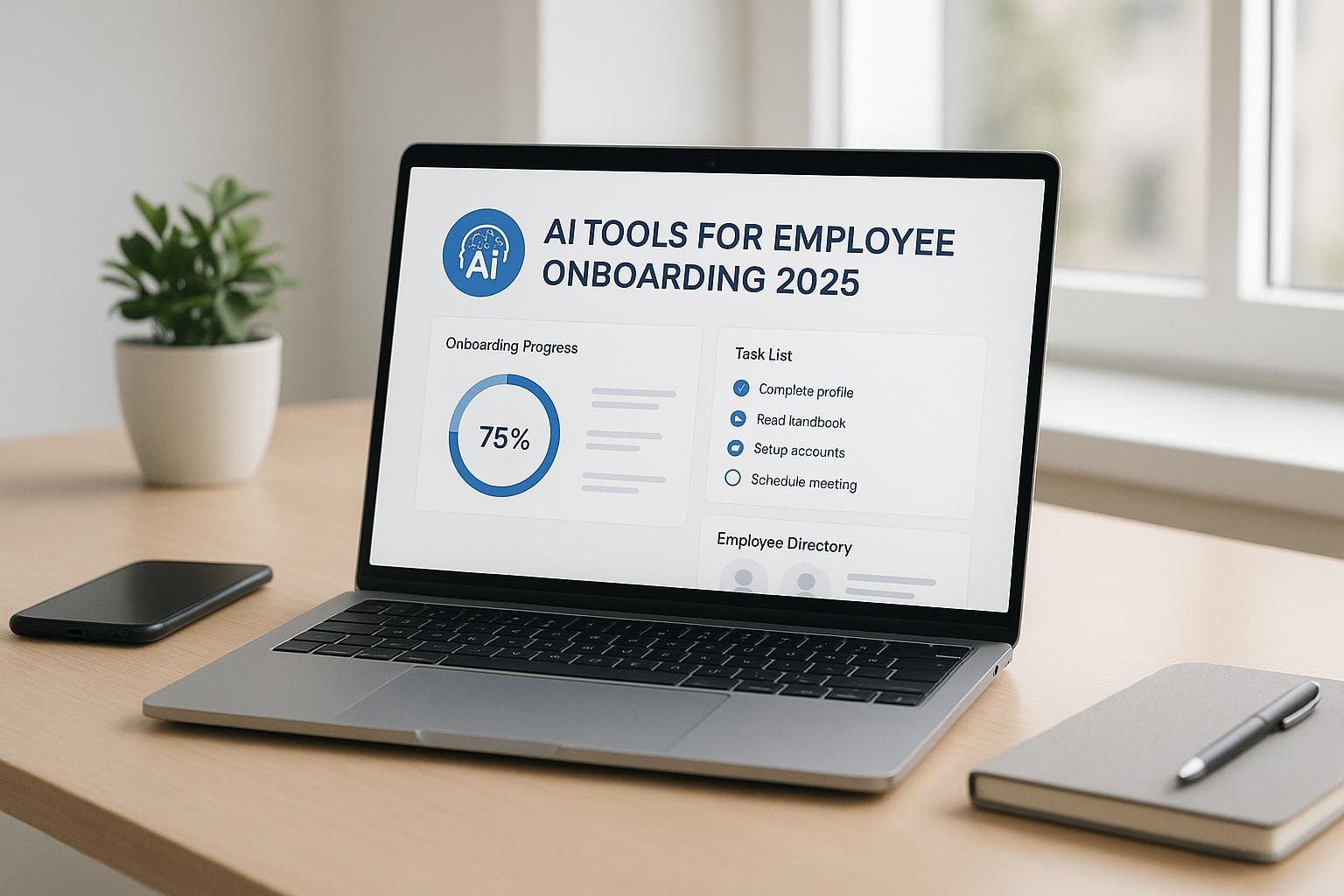
AI Tools for Onboarding in High-Growth Companies: 10 Solutions for 2025
Save $18,000 per hire and boost retention by 82% with AI tools that prevent onboarding chaos when scaling from 5 to 50+ monthly hires.

Written by
Adam Stewart
Key Points
- Cut onboarding time from 20 hours to 12 per new hire with AI automation
- Reduce time-to-productivity by 53% using smart workflow tools
- Handle voice communication gaps that digital onboarding platforms miss
- Prevent manual process breakdown when scaling beyond 50 monthly hires
Your company just doubled its headcount in three months. Now your HR team is drowning. Traditional onboarding processes weren't built for this kind of growth, and they're breaking down fast. That's exactly why AI tools for onboarding in high-growth companies have shifted from nice-to-have to absolutely essential.
The numbers back this up: companies using AI onboarding tools save over $18,000 annually per new hire and see 82% better retention rates. These platforms reduce time-to-productivity by 40-53% while cutting HR involvement from 20 hours to just 12 per new hire.
Here's a quick look at the top solutions:
- Dialzara: AI-powered phone assistant for onboarding calls, offering 24/7 support and integration with 5,000+ apps.
- BambooHR: HR platform with smart task assignments, predictive analytics, and automated compliance tracking.
- Leena.ai: Workflow-based compliance automation with adaptive processes for regulated industries.
- Workday: Enterprise-level platform with advanced compliance management and predictive analytics.
- Rippling: Unified HR, IT, and payroll platform with conditional workflows.
- ClearCompany: AI-driven talent management with automated checklists and milestone tracking.
- Hibob (Bob): Personalized onboarding workflows with strong integrations and mobile-friendly design.
- Personio: Customizable workflows for SMBs with real-time compliance tracking.
- Gusto: Payroll-focused platform with automated form collection and benefits enrollment.
- Paycom: Unified HR and payroll system with smooth data sharing.
Quick comparison
| Tool | Best For | Key Features | Compliance Support | Starting Price |
|---|---|---|---|---|
| Dialzara | Phone-based onboarding tasks | AI call handling, 24/7 availability | Guides I-9 and tax form completion | Budget-friendly for SMBs |
| BambooHR | All-in-one HR management | Task automation, smart assignments | State and federal compliance tools | $99/month (up to 25 users) |
| Leena.ai | Compliance-focused workflows | Adaptive processes, role-specific tasks | Strong regulatory alignment | Flexible pricing |
| Workday | Large enterprises | Advanced analytics, compliance engine | Real-time alerts, legal updates | Enterprise-level pricing |
| Rippling | Unified HR, IT, payroll | Conditional workflows, integrations | Automates reporting and tracking | Adjustable with growth |
| ClearCompany | SMB talent management | Personalized checklists, reminders | Tracks mandatory training | Scalable pricing |
| Hibob (Bob) | Engaging onboarding | Tailored workflows, mobile-friendly | I-9, W-4, audit trails | Modular pricing |
| Personio | Customizable for SMBs | Workflow engine, real-time tracking | Location-specific compliance | Modular pricing |
| Gusto | Payroll-first onboarding | Form automation, benefits setup | Tax filings, I-9 verification | $40/month + $6/employee |
| Paycom | Unified HR and payroll | Single database, data sync | Integrated compliance tools | Premium pricing |
Why AI tools for onboarding matter in high-growth companies
The math of rapid growth creates an onboarding crisis that compounds daily. When you're hiring 10, 20, or 50 people per month, manual processes designed for a handful of hires simply collapse.
Consider these challenges high-growth companies face:
- Volume overwhelm: HR teams that once managed personalized onboarding for five monthly hires suddenly face fifty requiring simultaneous attention.
- Consistency gaps: Manual onboarding takes 8-11 hours per hire, and 69% of managers say it demands too much time and attention.
- Retention risk: Companies with poor onboarding lose 16% of new hires within six months.
- Remote complexity: 36% of remote workers find onboarding confusing, compared to 32% of on-site employees.
AI onboarding platforms solve these problems by automating repetitive tasks, personalizing experiences at scale, and ensuring nothing falls through the cracks. Organizations using these tools see 95% of new employees completing onboarding within the first week, up from 60% within the first month.
sbb-itb-ef0082b
1. Dialzara: AI tools for onboarding phone communications
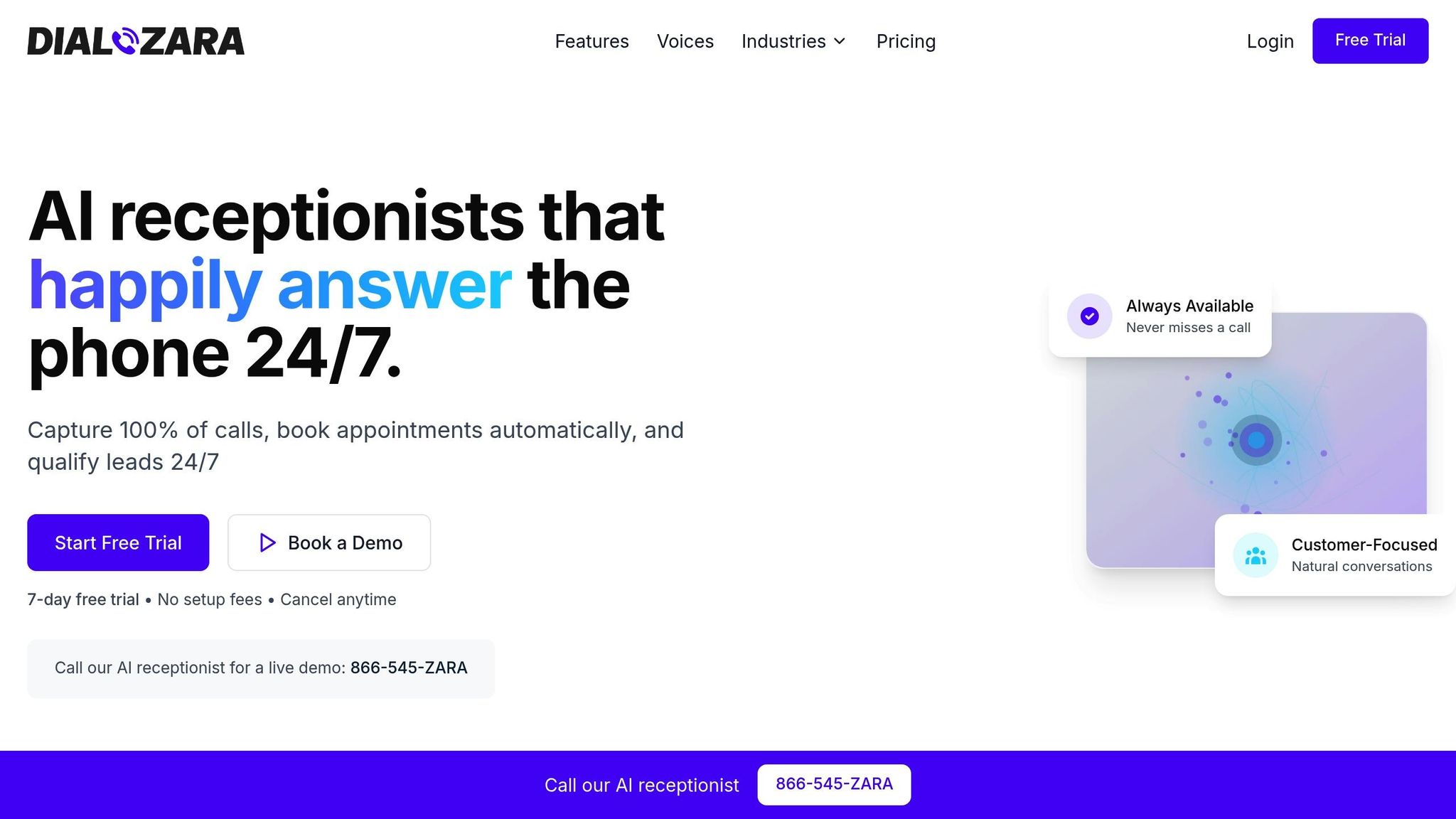
Dialzara stands out as an AI-powered virtual phone answering service designed to handle voice communications during onboarding. While most tools focus on digital forms, Dialzara manages the phone interactions that come with bringing new employees on board - answering questions, scheduling orientation sessions, and routing calls to the right departments.
Automation capabilities
Dialzara takes over time-consuming phone tasks by answering common benefits questions, guiding new hires to digital forms, and scheduling orientations without human intervention. When a new employee calls with onboarding questions, the platform delivers instant, accurate responses tailored to your company's specific information.
The platform excels at pre-boarding by gathering essential information from new hires over the phone. This ensures HR teams receive well-organized, actionable data before the employee's start date. Its intelligent call screening identifies the purpose of each call and routes it appropriately - HR for benefits questions, IT for technical setup issues.
Integration with business systems
Dialzara connects with over 5,000 business applications through native integrations and Zapier, making it easy to incorporate into existing onboarding workflows. Its ability to sync with HR, scheduling, and communication systems ensures smooth information flow between platforms.
By automating data transfer and triggering workflows, Dialzara eliminates manual data entry that slows down onboarding. This integration saves time and boosts efficiency, letting businesses focus on strategic tasks.
Scalability for high-growth companies
For rapidly scaling businesses, Dialzara offers a solution that deploys in minutes. Operating 24/7, it handles high call volumes during peak hiring periods without requiring additional staff. The platform claims to reduce costs by up to 90% compared to hiring human staff for call answering and onboarding support.
During hiring surges, Dialzara manages multiple calls simultaneously, ensuring new hires receive timely responses regardless of volume. This capability proves especially valuable for companies with seasonal hiring or rapid growth. Check pricing plans to see which tier fits your call volume.
Compliance support
While Dialzara doesn't process legal documents directly, it guides new hires through compliance steps like I-9 verification and state-specific tax forms. It directs employees to the right resources, ensuring they complete tasks efficiently. The platform understands industry-specific terminology and reflects your company's communication style, keeping compliance conversations professional and accurate.
2. BambooHR: AI tools for creating onboarding milestones

BambooHR is a strong HR platform designed to simplify and personalize onboarding. It goes beyond form collection, offering tailored experiences that align with specific roles, departments, and company policies.
Automation capabilities
BambooHR uses AI to automatically create customized checklists based on job roles, departments, and locations. The onboarding tasks for a marketing coordinator differ significantly from those for a software engineer, ensuring a tailored experience.
The platform's smart task assignment feature distributes responsibilities smoothly. Tasks like setting up laptops go to IT, benefits enrollment is assigned to HR, and team introductions are handled by direct managers. Its predictive analytics identify potential bottlenecks by analyzing historical data - flagging delays in IT equipment procurement during busy hiring periods, for example.
Both new hires and managers benefit from automated reminders and notifications, keeping everyone on track. This makes BambooHR one of the strongest options for creating onboarding milestones available today.
Integration with business systems
BambooHR connects with over 125 widely-used business tools, including Slack, Microsoft Teams, and Google Workspace. This integration ensures new hire information automatically syncs across systems, eliminating redundant data entry.
For companies with unique software needs, BambooHR's API-first architecture allows custom integrations. The platform also integrates with payroll tools like ADP and Paychex, ensuring accurate and timely transfer of new hire data.
Scalability for SMBs
BambooHR is designed to grow with small businesses. Its tiered pricing, starting at $99 per month for companies with up to 25 employees, makes it accessible for businesses just starting out. During peak hiring seasons, BambooHR handles batch onboarding efficiently, allowing HR teams to onboard multiple employees simultaneously without compromising quality.
Compliance support
BambooHR includes built-in compliance templates for federal requirements like I-9 verification, W-4 forms, and FLSA classifications. It automatically selects appropriate forms based on employee location and job type. The platform's audit trail functionality records every onboarding action with timestamps and user details, providing clear records for compliance reviews.
3. Leena.ai: AI automation for onboarding and compliance
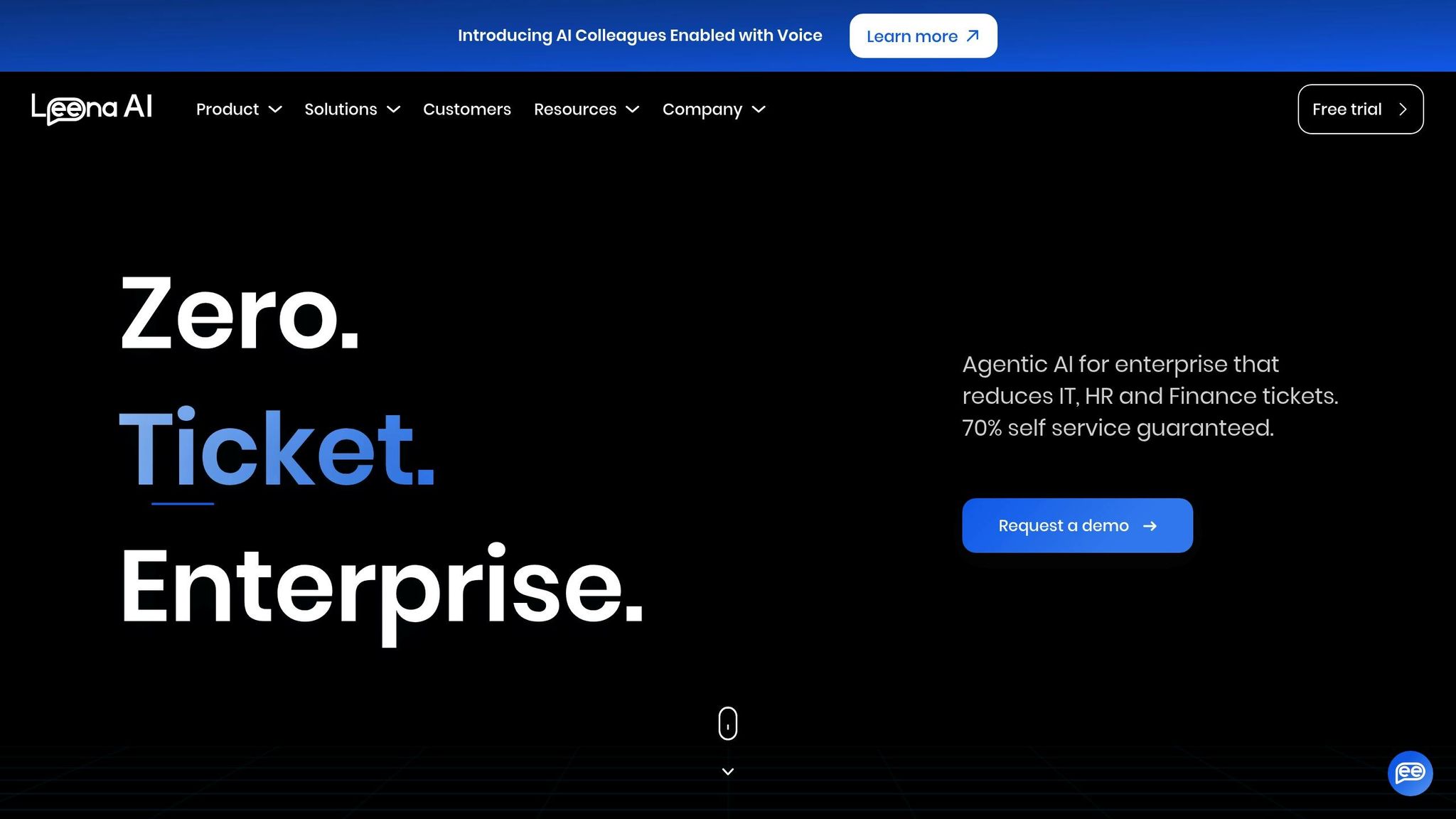
Leena.ai takes onboarding automation further by weaving compliance into every stage of the process. Designed for both enterprises and SMBs, it handles compliance using smart workflows that align with U.S. hiring regulations.
What sets Leena.ai apart is its ability to automate key compliance tasks during onboarding. By using adaptive workflows, the platform tailors processes to meet specific regulatory needs of different roles, industries, and locations. This ensures faster onboarding with precise adherence to legal requirements - making it ideal for HR compliance monitoring and reporting.
4. Workday: Enterprise AI tools for onboarding in high-growth companies
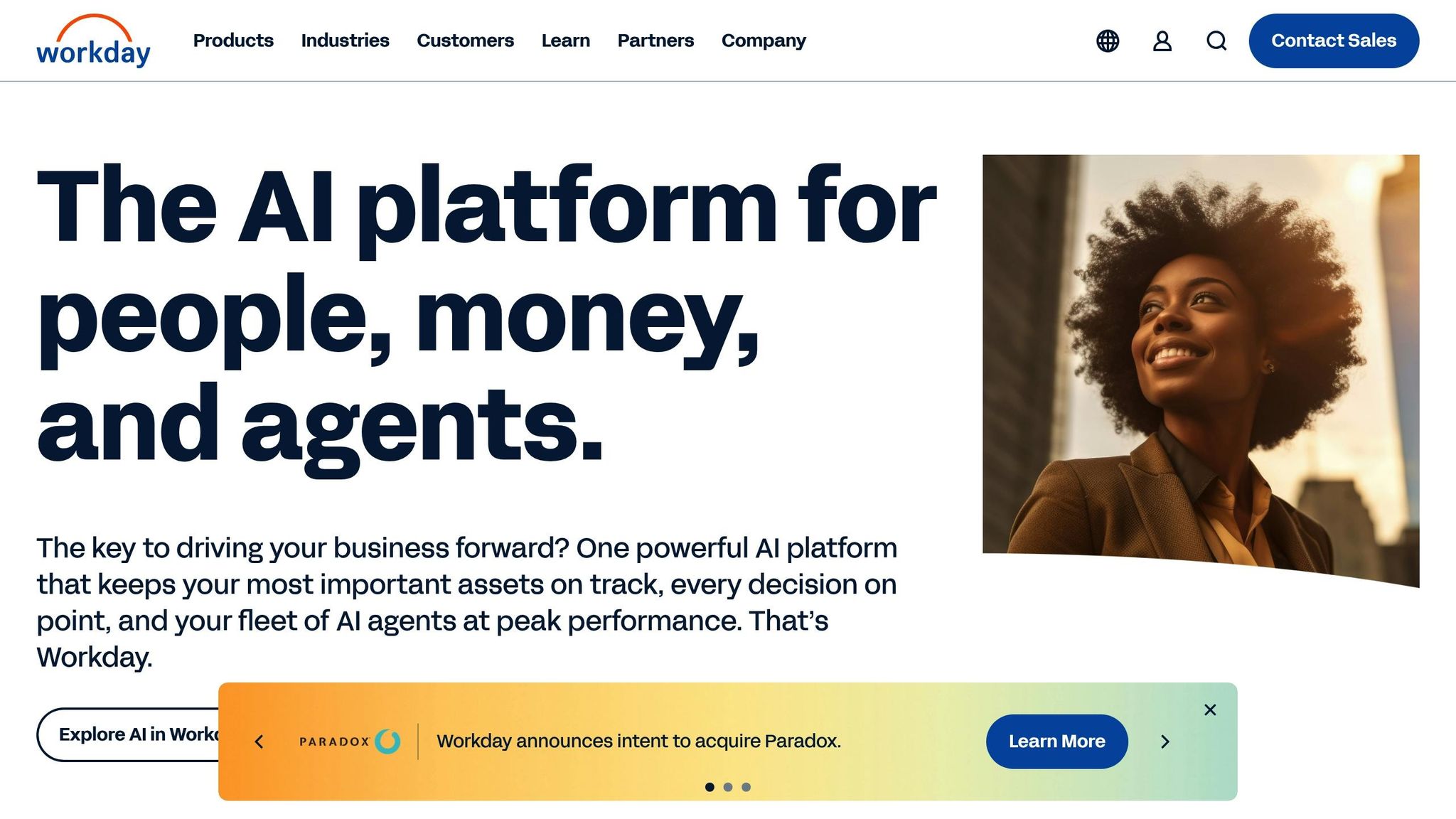
Workday is a strong enterprise HR platform designed to simplify onboarding through advanced AI-driven capabilities. It caters to organizations of all sizes, making it practical for high-growth businesses scaling their HR operations.
Automation capabilities
Workday's standout feature is its ability to automate critical compliance tasks. The platform's built-in compliance engine handles compliance checks, ensuring hiring processes align with legal requirements.
For complex scenarios like rehiring former employees, Workday automatically triggers correct compliance forms, significantly reducing error risk. The platform supports predictive analytics to identify potential onboarding bottlenecks before they impact new hire productivity.
Integration with business systems
Workday ensures data accuracy through partnerships with specialized compliance services like Experian Employer Services, enabling smooth Form I-9 management. When a new employee account is created, Workday automatically assigns Section 1 of Form I-9 and syncs data across platforms.
Compliance support
Workday excels at navigating U.S. federal employment regulations. The platform offers detailed reporting and auditing tools to track compliance efforts, including workforce demographics and diversity metrics. A dedicated compliance dashboard provides real-time alerts, helping HR professionals address potential issues before they escalate.
Considering that non-compliance with Form I-9 regulations can lead to penalties reaching tens or hundreds of thousands of dollars, Workday's comprehensive compliance tools offer significant protection during onboarding.
5. Rippling: AI integrations for onboarding workflows
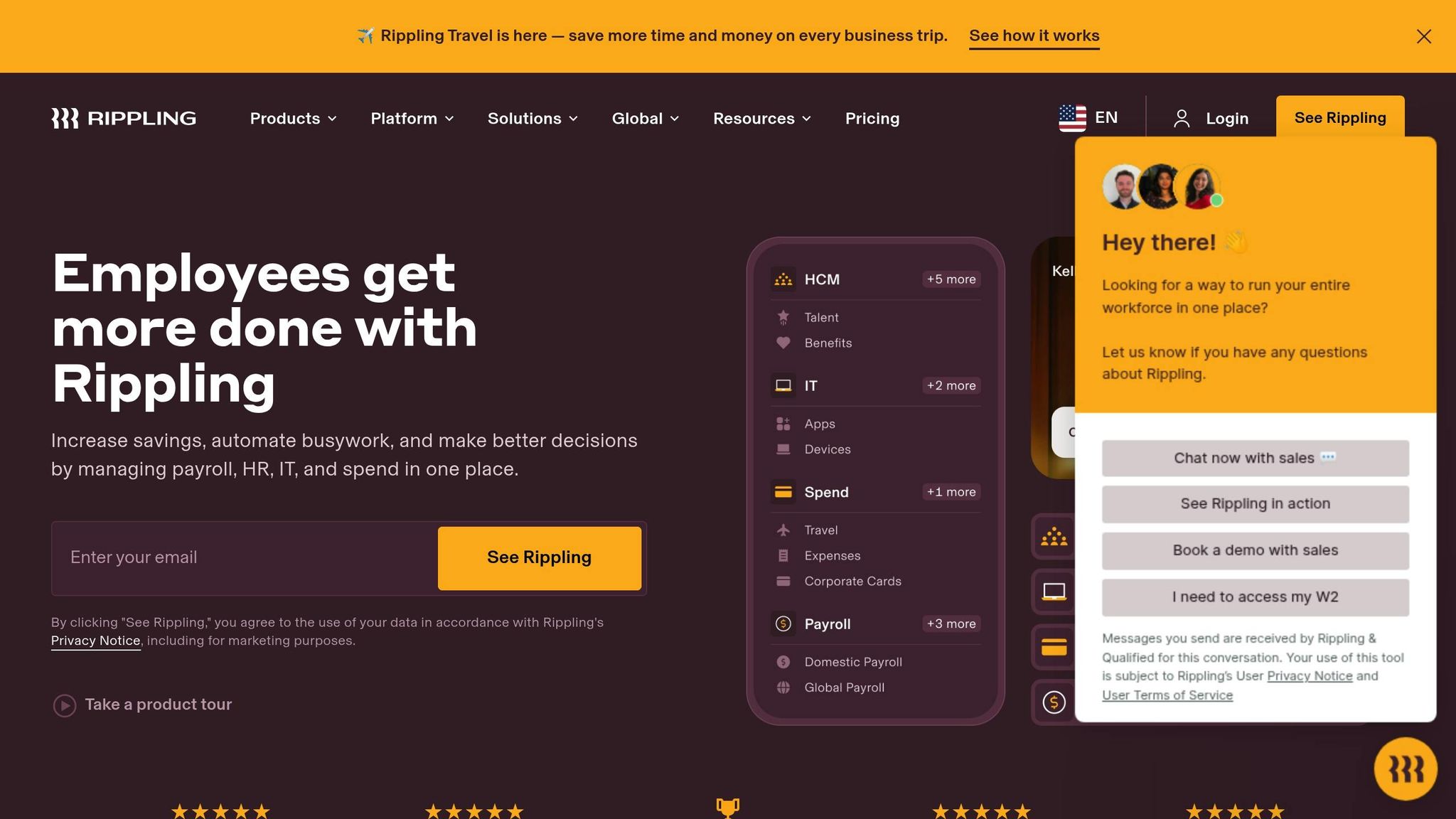
Rippling simplifies employee onboarding by automating tedious tasks and bringing HR, IT, and payroll functions together under one roof. This integration helps cut administrative headaches and keeps everything running smoothly.
Automation features
Rippling offers automation tools for managing documents and setting up user accounts. With conditional workflows, the platform customizes onboarding for each role, ensuring employees get the right training and access from day one.
AI integrations for onboarding workflows
The platform connects with a wide range of business applications, centralizing employee data in one place. Its API allows for custom integrations, making payroll and benefits administration more efficient. This makes Rippling one of the best options for companies seeking strong AI integrations for onboarding workflows.
Designed for growing SMBs
Rippling includes self-service tools that let new hires handle onboarding tasks independently while maintaining secure, role-specific access. Its pricing adjusts as businesses grow, making it a great fit for high-growth companies. The platform's compliance tools ensure onboarding remains efficient and secure as you scale.
6. ClearCompany: AI-driven milestone tracking
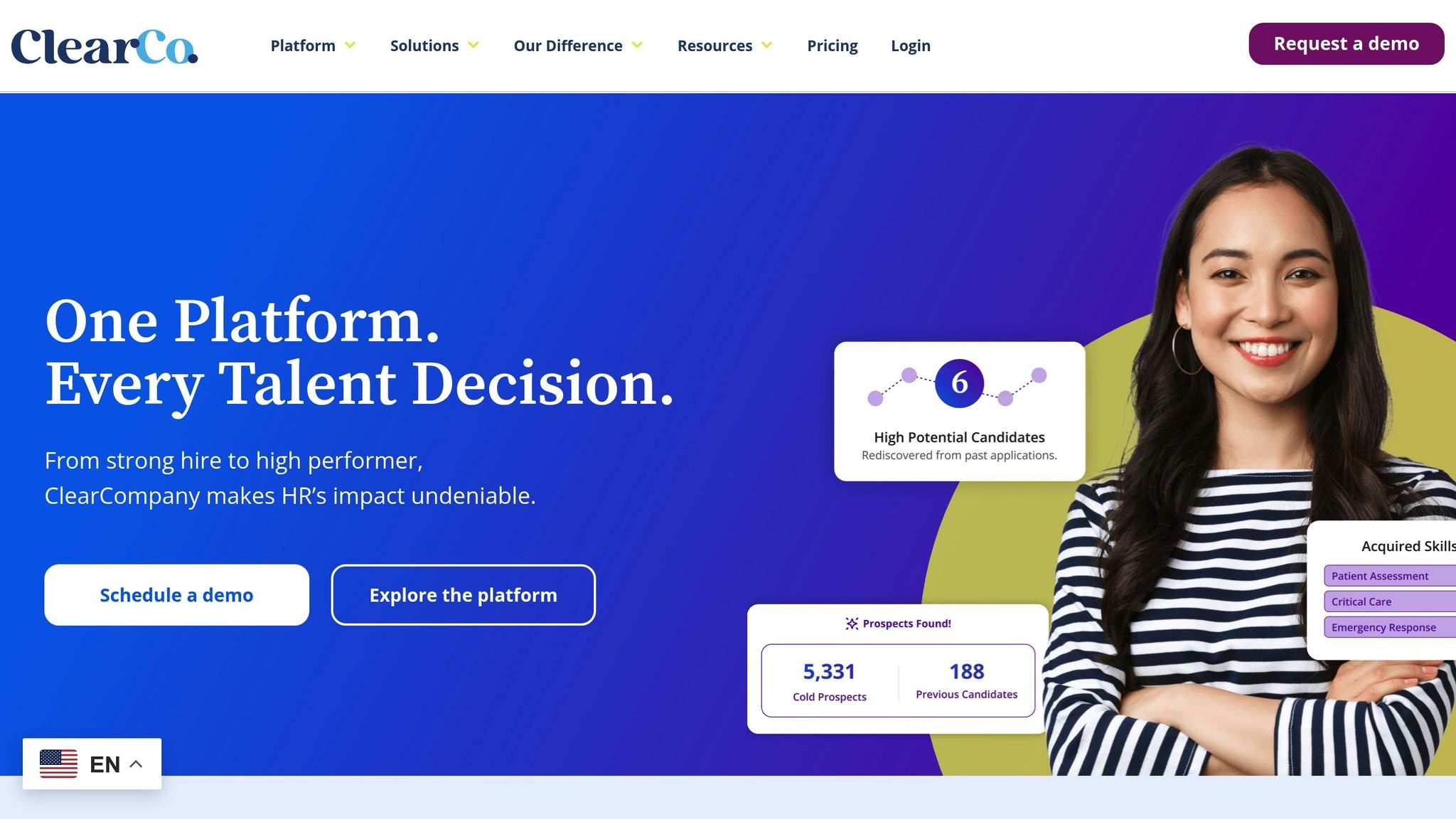
ClearCompany takes onboarding to the next level with its AI-driven talent management platform. Designed with SMBs in mind, it combines automation with personalization to create better onboarding experiences.
Automation features
ClearCompany's AI generates customized checklists, sends automated reminders, assigns role-specific training, and digitizes paperwork. It flags potential bottlenecks to help HR teams fine-tune processes. New hires receive personalized welcome messages and can complete paperwork online before their first day.
Integration with existing tools
ClearCompany connects with Slack, Microsoft Teams, and Google Workspace. It also integrates with existing HRIS and payroll systems through an open API, cutting duplicate data entry and speeding up onboarding.
Compliance made easy
Staying compliant with U.S. labor laws is simple with ClearCompany. It automatically generates I-9 and W-4 forms, tracks mandatory training completion with audit trails, and adjusts workflows for state-specific requirements. The platform also offers a self-service portal for easy customization.
7. Hibob (Bob): Personalized AI onboarding workflows
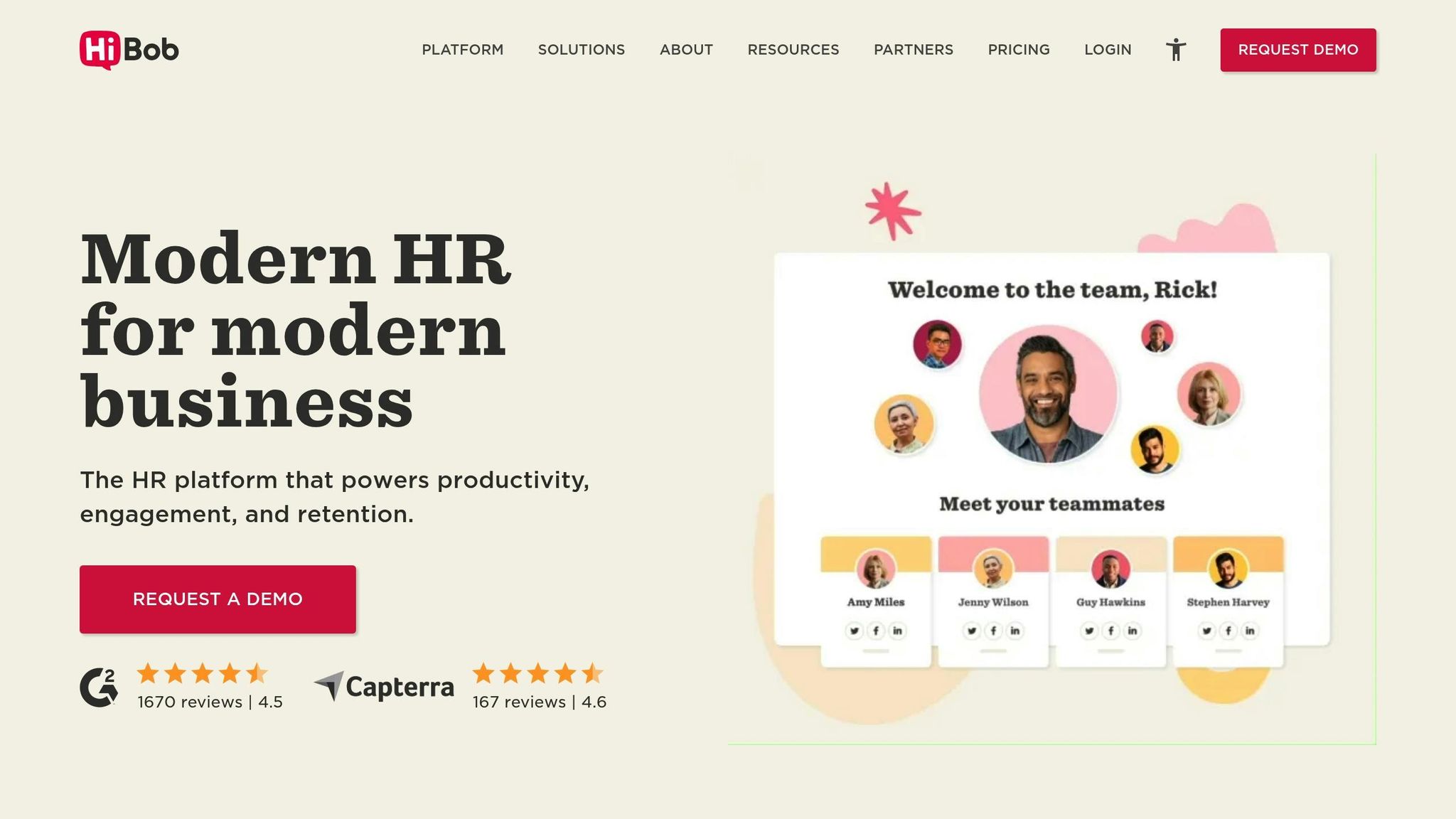
Hibob, often called Bob, is a modern HR platform designed to simplify and improve employee onboarding. This cloud-based tool has become a favorite among growing companies eager to modernize their HR processes.
Automation features
Bob's onboarding engine uses AI to create tailored workflows for specific roles, departments, and locations. Each new hire gets a personalized experience with role-related tasks, training modules, and milestone markers. Automated welcome emails provide clear timelines while the system tracks progress and sends reminders.
The smart task assignment feature ensures responsibilities are divided efficiently. IT gets notified to prepare equipment, facilities receive desk setup requests, and managers are reminded to arrange one-on-one meetings. Over time, Bob's AI learns from past onboarding cycles, identifying areas for improvement.
Scalable for growing businesses
Bob's modular pricing structure works for small businesses, offering essential onboarding features with flexibility to add more functionality as the company grows. It handles everything from onboarding a single employee to managing bulk hires during rapid expansion.
Compliance made easy
Bob simplifies compliance by automating form generation and tracking. It ensures I-9 verification deadlines are met, W-4 forms are completed accurately, and state-specific requirements are addressed. The platform keeps detailed audit trails, documenting when forms are completed, training is finished, and approvals are secured.
8. Personio: Customizable AI onboarding for SMBs
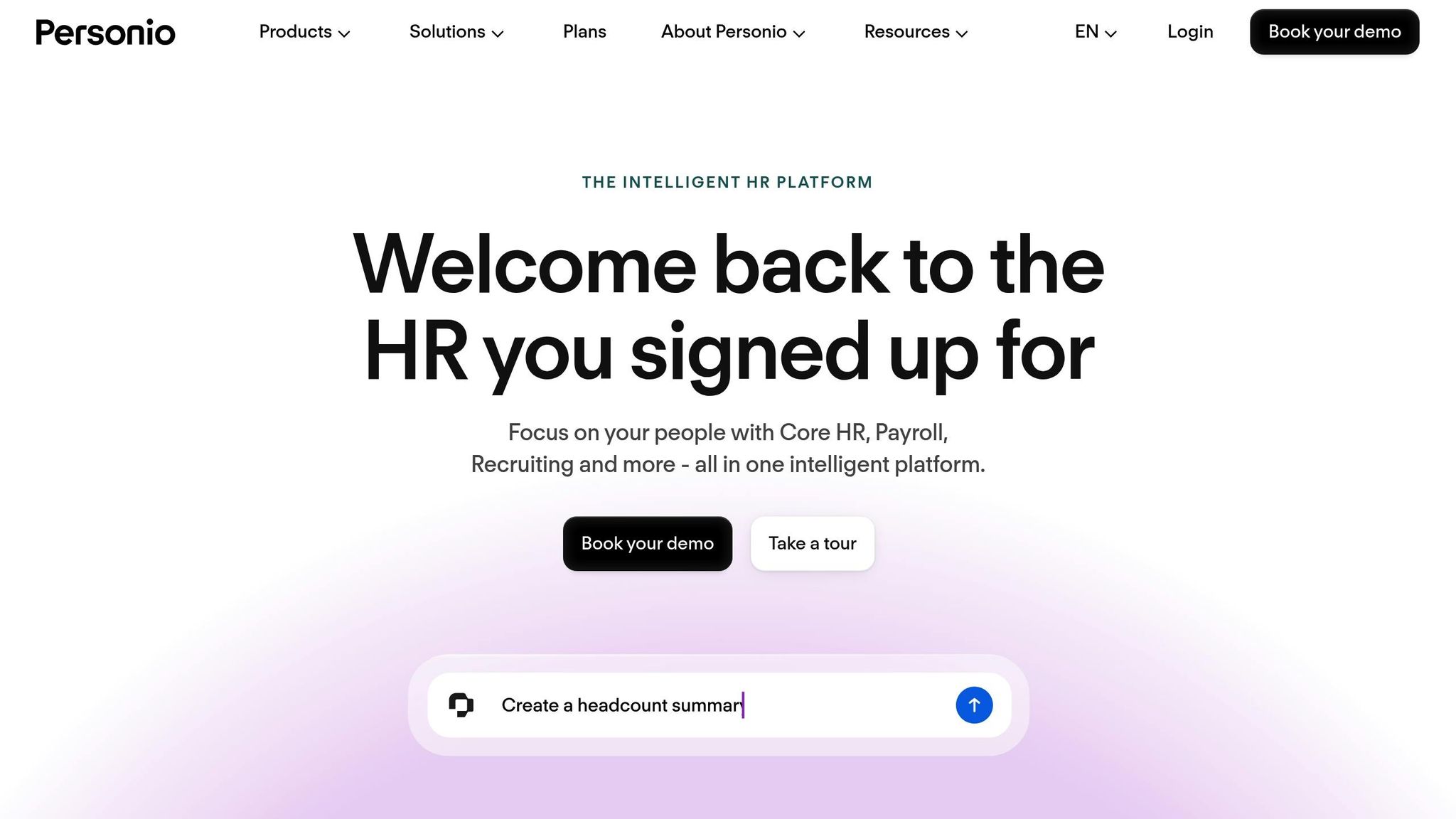
Personio is an HR platform designed to simplify employee onboarding for small and medium-sized businesses with customizable workflows and self-service tools.
Automation capabilities
Personio's workflow engine tailors onboarding experiences to specific roles, departments, and locations. It automatically schedules IT equipment delivery, sets up training sessions, and arranges manager check-ins. It also handles document automation, pre-filling forms and enabling digital signatures.
HR teams monitor progress through a tracking dashboard that highlights issues needing immediate attention. These automation features integrate with other tools for a smooth onboarding process.
Integration with business systems
Personio connects with payroll systems, communication tools like Slack and Microsoft Teams, learning platforms, and identity management software. These integrations automate tasks like introducing new hires to teams, enrolling them in training programs, and setting up user accounts.
Designed for growing SMBs
Personio is built to grow alongside your business. Its modular pricing and flexible features work whether you're onboarding one person or managing a large batch of new hires. For remote teams, features like digital document signing, virtual office tours, and online training make onboarding smooth.
9. Gusto: AI onboarding tools that reduce manual paperwork
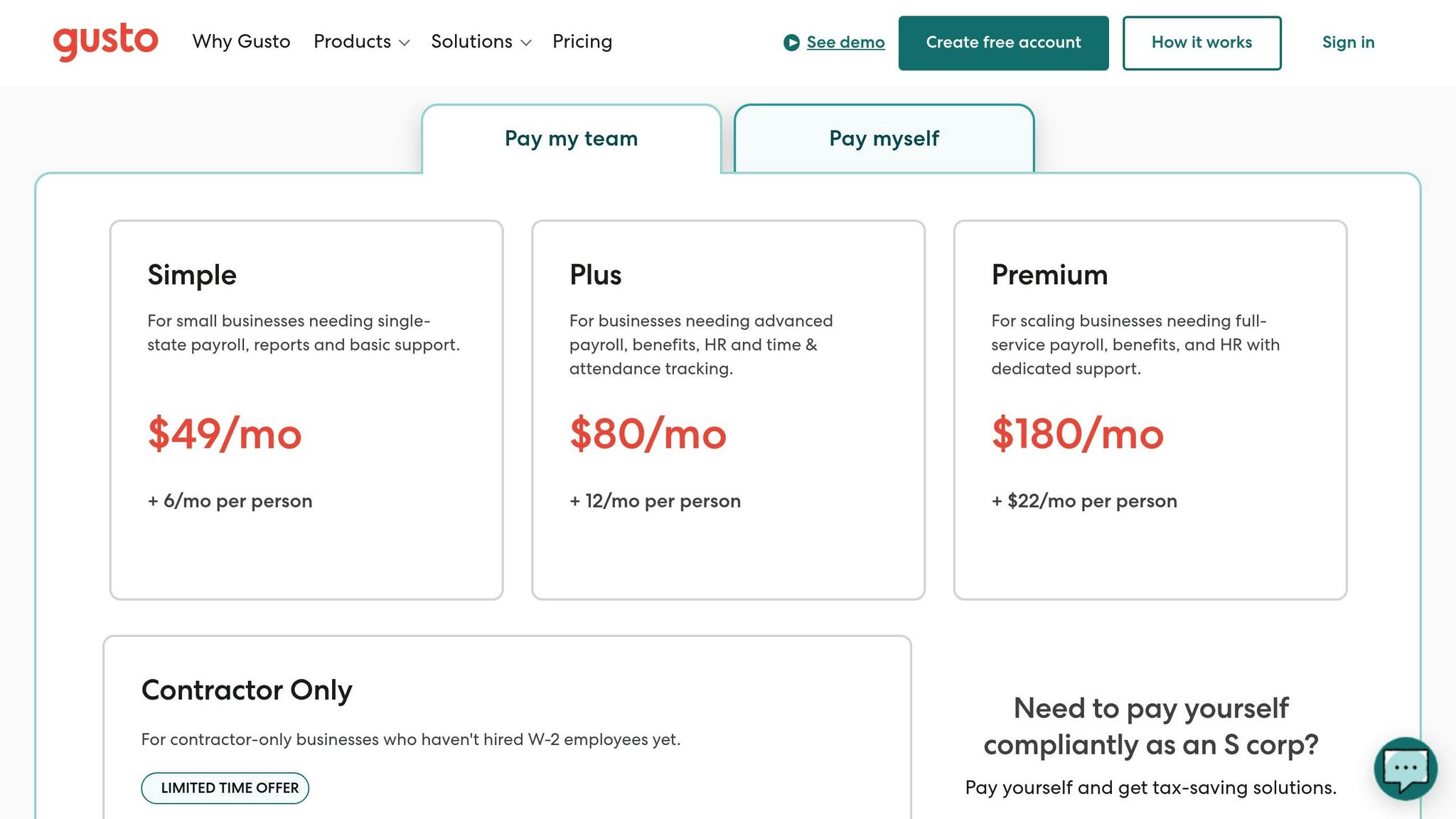
Gusto blends payroll processing with HR tools to simplify employee onboarding. It's designed to eliminate administrative headaches while ensuring compliance with federal and state regulations.
Automation capabilities
Gusto's automation focuses on document collection and payroll setup. New hires receive automated email invitations to complete digital forms - tax documents, direct deposit information, and emergency contact details. Once submitted, the system automatically updates employee data across payroll, benefits, and HR records.
This approach shows how AI onboarding tools reduce manual paperwork setup time. Organizations using AI for paperwork automation save 45-105 minutes per hire on document collection alone.
Integration with business systems
Gusto connects with over 100 business applications:
- Accounting software like QuickBooks and Xero sync financial data effortlessly.
- Time tracking tools automatically import employee hours into payroll.
- Background check services like Checkr and Sterling can be launched directly from Gusto.
Scalability for SMBs
Pricing starts at $40 per month plus $6 per employee for the Core plan, making it accessible for companies ranging from solo entrepreneurs to businesses with over 100 employees. Multi-location support enables businesses with offices in different states to manage varying tax rules and labor laws from a single dashboard.
Compliance support
Gusto handles federal tax filings, including W-2s, 1099s, and quarterly reports, while staying current with tax rate changes across all 50 states. The platform includes tools for I-9 verification, guiding employers through proper documentation and maintaining digital records for audits.
10. Paycom: Unified HR and payroll for high-growth companies
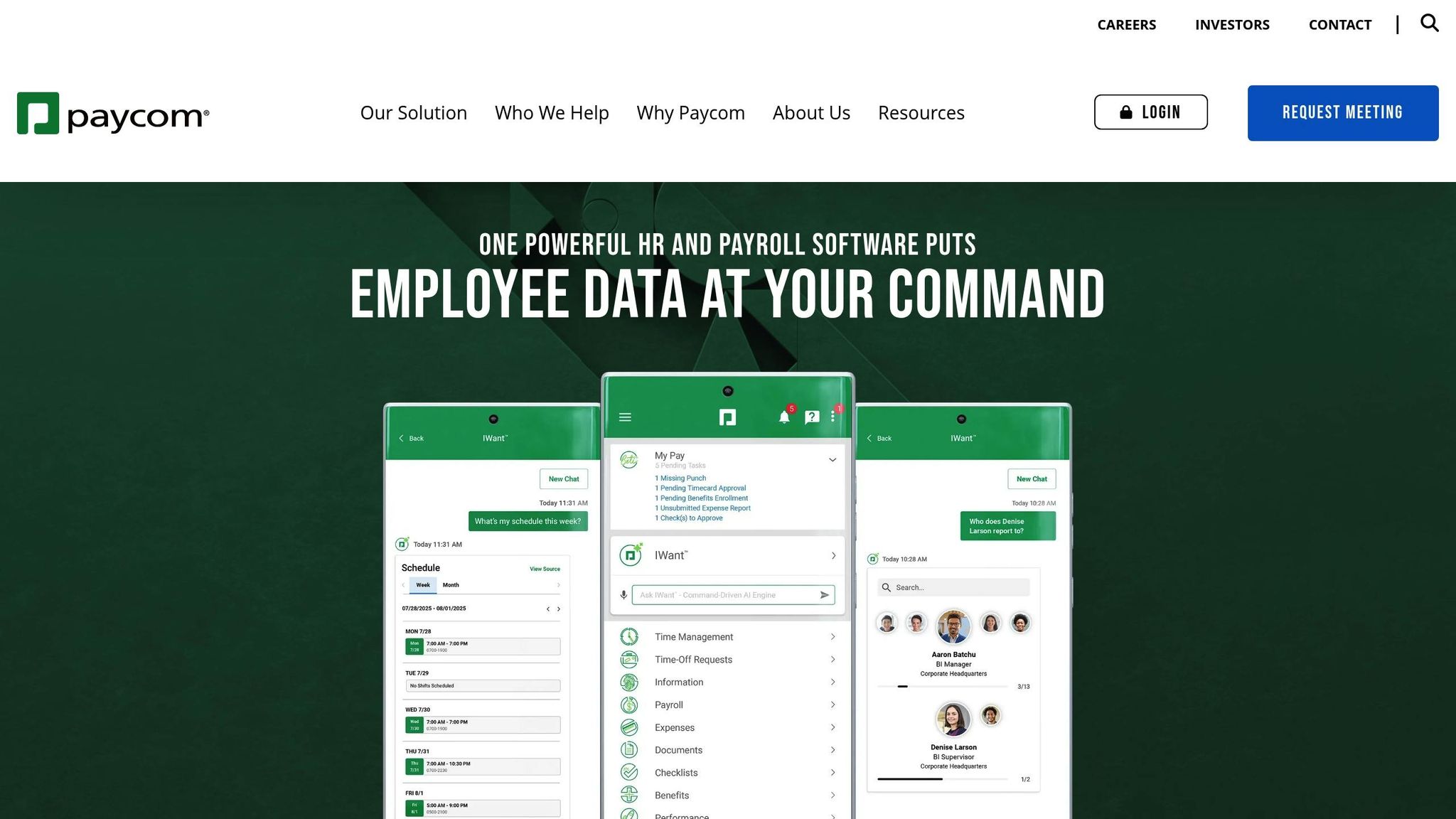
Paycom offers a unified, single-database system that brings together HR and payroll functions. This setup ensures data flows smoothly across processes, cutting out repetitive manual data entry.
Automation capabilities
With its single-database structure, Paycom synchronizes employee data across all HR functions. This simplifies routine tasks, ensuring processes run efficiently with fewer errors.
Integration with business systems
Paycom's centralized system supports precise integrations. In 2025, Paycom introduced a direct integration with Trainual, a popular onboarding and training platform. This feature allows businesses to add new team members to Trainual with just a few clicks.
AI formats for retail onboarding: Industry-specific considerations
The retail industry is ripe for an AI-driven onboarding overhaul. High turnover rates, seasonal hiring spikes, and constant need to stay ahead of consumer trends make AI formats for retail onboarding particularly valuable.
A retail company that implemented AI-based onboarding tools to deliver interactive, gamified training modules tailored to different roles cut time-to-productivity by 25%. Key considerations for retail include:
- Seasonal scalability: Tools must handle hiring surges during holidays without overwhelming HR.
- Mobile-first design: Retail employees often lack desk access, making smartphone-friendly onboarding essential.
- Role-specific training: Different positions (cashier, stockroom, management) require distinct onboarding paths.
- Compliance tracking: Retail faces specific regulations around minor employment, break requirements, and safety training.
For businesses in retail and similar industries requiring constant phone availability, an AI virtual receptionist can handle onboarding calls while staff focus on training and floor operations.
Feature and pricing comparison for AI tools in high-growth onboarding
Understanding differences in features and pricing helps you find the right solution. Whether you're a small team seeking budget-friendly options or an enterprise requiring substantial investment, here's how various tools deliver value.
Dialzara stands out for affordability. With 24/7 AI-powered phone support, it can reduce staffing costs by up to 90%, making it excellent for SMBs in industries like legal, healthcare, and insurance.
BambooHR is tailored for small teams, offering a wide range of HR management tools beyond onboarding. It's a strong choice for growing businesses looking for an all-in-one solution.
Leena.ai specializes in AI-driven employee assistance with flexible pricing designed for medium-sized companies. It's particularly useful for organizations integrating AI throughout onboarding.
Workday is built for large enterprises, offering comprehensive features and scalable solutions. However, its complexity and higher price point may not suit smaller organizations.
Rippling combines HR, payroll, and IT management into a single platform. This integration appeals to tech-savvy companies, though it may include features extending beyond basic onboarding needs.
For payroll-focused solutions, Gusto is budget-friendly for small businesses needing payroll alongside basic onboarding features. Paycom provides a premium, fully integrated HR system with smooth data sharing.
When it comes to integration, Dialzara shines with its ability to connect with over 5,000 business applications. For organizations prioritizing fast implementation and immediate results, this broad connectivity leads to quicker returns on investment.
Choosing the right AI tools for onboarding in high-growth companies
AI tools for onboarding in high-growth companies are no longer optional - they're essential for scaling efficiently. These platforms slash new hire paperwork by 30% and cut time-to-productivity by 25%, delivering measurable ROI from day one.
Take Dialzara's AI phone agent as an example - it can reduce costs by up to 90%, delivering substantial savings for SMBs while saving valuable time. With automation handling welcome emails, training module assignments, and compliance tracking, HR teams can shift focus to strategic priorities.
AI-powered onboarding platforms also personalize role-specific pathways, helping boost employee engagement and reduce early turnover rates. Companies using these tools see 82% better retention and 70% higher productivity among new hires.
The best approach? Start with tools that address your biggest pain points. If phone communications are overwhelming your HR team, try Dialzara free for 7 days. If milestone tracking and compliance are your priorities, consider BambooHR or ClearCompany. For unified HR, IT, and payroll, Rippling or Paycom might be your best bet.
Whatever you choose, the data is clear: AI tools for onboarding in high-growth companies deliver faster ramp times, higher engagement rates, and reduced burnout for People Operations teams. The question isn't whether to adopt them - it's which ones fit your specific needs.
FAQs
How can AI tools help businesses comply with U.S. labor laws during employee onboarding?
AI tools simplify compliance by automating critical processes like verifying employment eligibility, ensuring equitable hiring practices, and keeping documentation current. These tools keep HR teams informed about changing federal and state regulations through real-time updates and notifications.
AI improves accuracy and simplifies compliance monitoring, cutting the likelihood of errors, violations, or legal issues. By automating these time-consuming tasks, businesses can dedicate more energy to delivering smooth onboarding experiences while staying fully compliant with labor regulations.
What are the main advantages of using AI phone assistants like Dialzara for onboarding calls?
AI-powered phone assistants like Dialzara simplify onboarding calls by handling routine tasks such as screening calls, transferring them, and collecting essential information. This saves time and cuts manual work while ensuring clear, consistent communication.
Available around the clock, Dialzara offers uninterrupted support without adding staffing expenses. It understands industry-specific terms and aligns with your business's communication style, delivering a smooth, professional experience for new employees. Learn more about available AI voices to find one that matches your brand.
What should small and medium-sized businesses look for when choosing an AI tool for employee onboarding?
When choosing an AI onboarding tool, SMBs should consider several critical factors:
- Automation features: Look for tools that simplify repetitive tasks and save time.
- Personalization options: The tool should tailor experiences to fit your business needs.
- Integration capabilities: It should work smoothly with existing systems to avoid complications.
- Budget alignment: Make sure pricing fits what you can afford while meeting specific requirements.
- Scalability: Pick solutions that grow with your business.
Prioritize tools that are simple to set up and adapt to your processes. This saves time and boosts efficiency, turning the tool into a true asset for your growing team.
Summarize with AI
Related Posts
10 Ways AI Streamlines Benefits Administration in HR
Discover how AI revolutionizes HR by enhancing employee experiences, ensuring compliance, and streamlining benefits administration for improved efficiency and satisfaction.
Top AI Tools for Personalized Customer Service
Explore how AI tools enhance personalized customer service for SMBs, from chatbots to email marketing, while saving costs and improving efficiency.
7 AI-Powered Talent Demand Forecasting Tools for HR
Explore 7 AI-powered talent demand forecasting tools for HR, learn about their key features, and understand how AI is transforming workforce planning and management.
AI for HR Compliance: Monitoring & Reporting
Discover how AI can streamline HR compliance through monitoring, reporting, and training. Learn the steps to implement AI in compliance processes.
